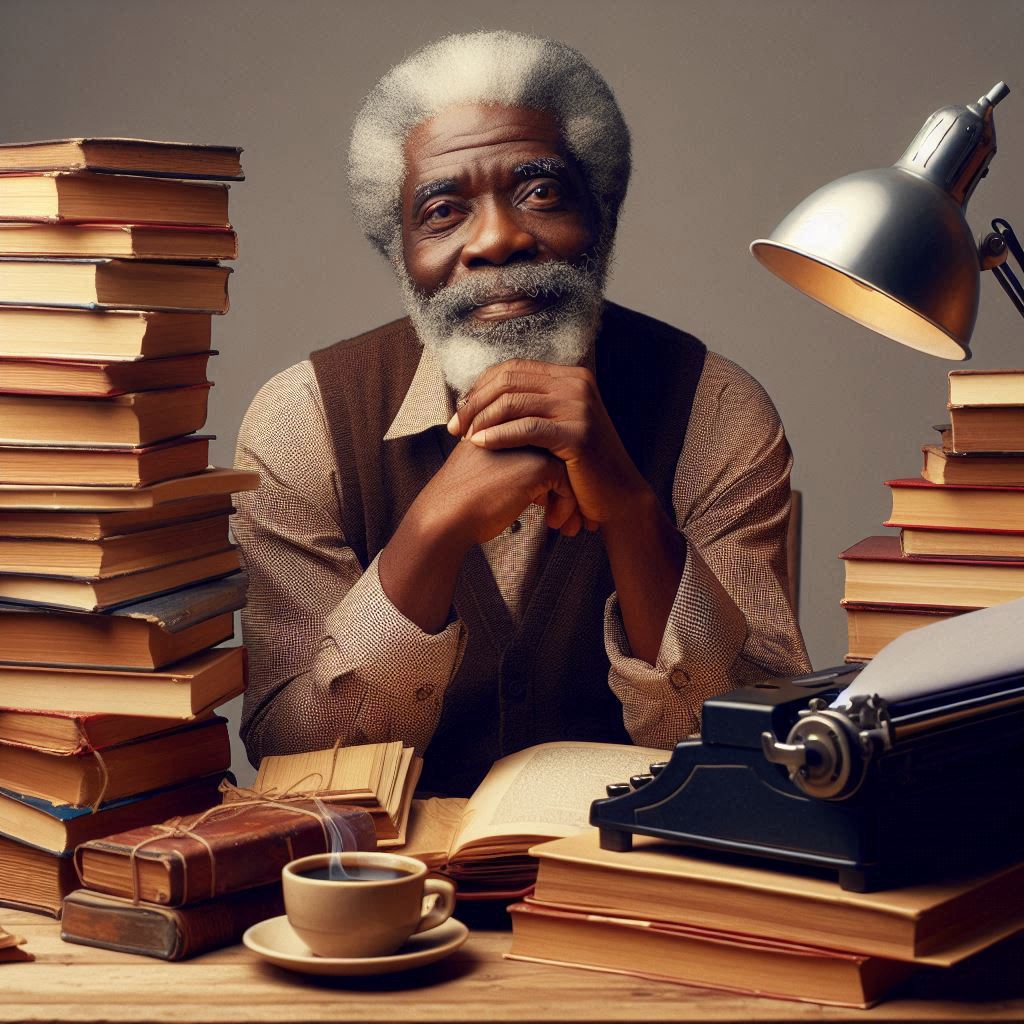Introduction
Nigerian playwrights play a crucial role in the country’s cultural landscape.
They capture the essence of Nigerian society through their works, addressing various social, political, and cultural themes.
The rich tradition of theater and performance arts in Nigeria dates back centuries, reflecting the diverse cultural heritage of the nation.
This tradition encompasses storytelling, masquerades, festivals, and contemporary theater, making it a vibrant part of Nigerian life.
Prominent playwrights like Wole Soyinka, Femi Osofisan, and Ola Rotimi have made significant contributions to Nigerian theater.
Wole Soyinka, the first African Nobel Laureate in Literature, is renowned for his powerful plays that tackle political oppression and human rights.
Femi Osofisan’s works often address social justice and cultural identity, blending traditional forms with contemporary issues.
Ola Rotimi is celebrated for his historical plays that delve into Nigeria’s pre-colonial and colonial past.
These playwrights have gained national and international recognition for their impactful stories.
Their works have been performed on stages worldwide, showcasing the depth and richness of Nigerian theater.
Wole Soyinka
Wole Soyinka, born on July 13, 1934, in Abeokuta, Nigeria, is a renowned playwright, poet, and essayist.
He grew up in a Yoruba family and was deeply influenced by traditional African culture.
Soyinka attended Government College in Ibadan and later studied English literature at the University of Leeds in England.
His early exposure to both African traditions and Western education shaped his unique literary voice.
Soyinka’s career began with his return to Nigeria, where he engaged in theater and political activism.
He founded the theater group “The 1960 Masks” and later the “Orisun Theatre Company.
” These groups performed his early plays, blending African storytelling with European theatrical forms.
His works gained international acclaim, earning him the Nobel Prize in Literature in 1986, making him the first African laureate.
Overview of Notable Plays
“Death and the King’s Horseman,” written in 1975, is one of Soyinka’s most celebrated plays.
It explores the clash between British colonial authorities and Yoruba traditions.
The play is based on a historical event where a British colonial officer intervened in a ritual suicide, leading to tragic consequences.
The drama delves into themes of duty, honor, and the cultural misunderstandings between colonizers and the colonized.
“The Lion and the Jewel,” another significant work, was written in 1959.
This play is a comedic yet insightful exploration of the conflict between tradition and modernity in a Nigerian village.
It tells the story of Sidi, a beautiful village girl courted by Lakunle, a Westernized schoolteacher, and Baroka, the traditional village chief.
The play humorously critiques the impact of Western influence on African society.
Analysis of Themes and Motifs
Colonialism is a recurring theme in Soyinka’s works.
He often examines the impact of British rule on Nigerian culture and identity.
In “Death and the King’s Horseman,” Soyinka critiques the British colonial disregard for Yoruba customs and the tragic results of cultural imposition.
His portrayal of colonial officials as insensitive and arrogant highlights the destructive effects of colonialism.
Tradition versus modernity is another prominent theme in Soyinka’s plays.
In “The Lion and the Jewel,” Soyinka contrasts Lakunle’s modern ideas with Baroka’s adherence to tradition.
Through humor and satire, he explores the complexities of cultural change and the value of preserving indigenous practices.
This theme resonates deeply in a post-colonial context, reflecting Nigeria’s ongoing negotiation between past and present.
Soyinka also frequently addresses societal norms and individual responsibilities.
His characters often grapple with moral dilemmas and the demands of their community.
In “Death and the King’s Horseman,” the protagonist’s duty to commit ritual suicide for the greater good reflects the tension between personal desires and societal expectations.
Generally, Wole Soyinka’s background, education, and career significantly influenced his literary works.
His notable plays, such as “Death and the King’s Horseman” and “The Lion and the Jewel,” offer profound insights into colonialism, tradition, and societal norms.
Soyinka’s works remain pivotal in understanding the cultural and political landscape of Nigeria and continue to inspire and challenge audiences worldwide.
Read: Psychological Impact of COVID-19 on Nigerians
Femi Osofisan
Femi Osofisan is a prominent Nigerian playwright known for his impactful contributions to Nigerian theater.
Biography of Femi Osofisan
Femi Osofisan was born on June 16, 1946, in Erunwon, a town in Ogun State, Nigeria. He pursued a career in academia, teaching drama and comparative literature at the University of Ibadan.
His interest in theater led him to write numerous plays that have gained recognition both nationally and internationally.
Contributions to Nigerian Theater
Osofisan’s plays often reflect the political and social issues prevalent in Nigeria. His works serve as a platform to criticize societal norms and provoke thought among audiences.
One of his most famous plays is “Women of Owu,” which explores the theme of war and its impact on women in society.
The play is based on the historic Yoruba town of Owu and showcases the resilience of women in times of conflict.
Another renowned work by Osofisan is “Once Upon Four Robbers,” a play that delves into the complexities of power and corruption.
The story follows four robbers who embark on a journey to overturn a corrupt government.
Focus on Political and Social Issues
Osofisan’s plays are characterized by their focus on political and social issues. He uses his works to challenge the status quo and advocate for change in Nigerian society.
Through his use of poignant dialogue and vivid characters, Osofisan sheds light on issues such as corruption, oppression, and the struggle for power.
His plays serve as a mirror to the realities of Nigerian life and encourage audiences to critically examine the world around them.
Most importantly, Femi Osofisan’s significant impact on Nigerian theater cannot be overstated.
His thought-provoking plays continue to resonate with audiences, inspiring conversations about the pressing issues facing Nigerian society.
Read: Psychology and Counseling Services in Nigerian Schools
Zulu Sofola
Zulu Sofola was a prominent Nigerian playwright, born in 1935 in Ibadan. She was one of the first female playwrights in Nigeria and made significant contributions to Nigerian theater.
Background Information on Zulu Sofola
- Sofola obtained her PhD in English literature from the University of Ibadan.
- She was a lecturer at the University of Lagos and later became a professor of drama.
- Her work focused on exploring traditional Nigerian culture and challenging societal norms.
Overview of Sofola’s Plays
One of Zulu Sofola’s most famous plays is “The Wizard of Law,” which tells the story of a powerful deity who disrupts a village.
This play explores themes of power dynamics and the clash between tradition and modernity.
Another notable work by Sofola is “King Emene,” which explores themes of leadership and the impact of colonialism on traditional African societies.
The play delves into the complexities of political power and the struggle for autonomy.
Examination of Gender Roles and Power Dynamics
Zulu Sofola’s plays often challenge traditional gender roles in Nigerian society. She portrays strong female characters who defy societal expectations and take control of their own destinies.
Her work also delves into power dynamics within Nigerian communities, highlighting the complexities of familial and political structures.
Sofola’s plays explore the struggles for power and authority in a rapidly changing society.
Essentially, Zulu Sofola was a trailblazer in Nigerian theater, pushing boundaries and challenging societal norms through her thought-provoking plays.
Read: How Nigerian Schools Address Student Psychology

Ahmed Yerima
Ahmed Yerima is a renowned Nigerian playwright known for his impactful contributions to the Nigerian theatre scene.
Born in 1954 in Kano State, Nigeria, Yerima has had an illustrious career in playwriting that has earned him several awards and accolades.
Brief Biography of Ahmed Yerima
- Yerima studied Theatre Arts at the prestigious Ahmadu Bello University in Zaria, Nigeria.
- He later went on to obtain a Master’s degree in Drama from the University of Jos.
- Yerima started his career as a lecturer before delving fully into playwriting in the late 1980s.
- He has held various leadership positions in Nigerian theatre organizations, showcasing his commitment to the growth of the industry.
- Yerima’s works often touch on societal issues, cultural norms, and personal struggles, resonating with audiences across Nigeria and beyond.
Achievements as a Playwright
- Yerima has received numerous awards for his outstanding contributions to Nigerian theatre, including the coveted Nigeria Prize for Literature.
- His plays have been performed both locally and internationally, showcasing the universal appeal of his themes and storytelling.
- Yerima’s works have been lauded for their emotional depth, powerful dialogue, and thought-provoking narratives.
- He is considered a trailblazer in the Nigerian theatre scene, inspiring a new generation of playwrights with his works.
- Yerima’s impact on Nigerian theatre is unparalleled, cementing his legacy as one of the country’s most influential playwrights.
Analysis of Yerima’s Works
Two of Yerima’s most renowned works are “Little Drops” and “Dry Leaves on Uzoagba.” These plays delve into complex themes and showcase Yerima’s mastery of storytelling and character development.
“Little Drops”
- “Little Drops” explores the dynamics of family relationships and the impact of societal expectations on individuals.
- The play delves into themes of love, betrayal, and redemption, drawing the audience into a world of emotional complexity.
- Yerima’s use of vivid imagery and lyrical language captivates the audience, creating a lasting impact on their minds.
“Dry Leaves on Uzoagba”
- “Dry Leaves on Uzoagba” is a powerful commentary on colonialism and its enduring effects on Nigerian society.
- The play delves into the struggles of a community grappling with their cultural identity in the face of external pressures.
- Yerima’s nuanced portrayal of the characters and their dilemmas sheds light on the complexities of post-colonial Nigeria.
Yerima’s Narrative Techniques
Yerima’s use of storytelling and cultural traditions in his plays sets him apart as a playwright with a deep understanding of Nigerian society and its rich heritage.
- He seamlessly weaves traditional folk tales and customs into his narratives, adding depth and authenticity to his works.
- Yerima’s incorporation of indigenous languages and proverbs resonates with audiences, highlighting the importance of preserving cultural heritage.
- His exploration of societal issues through the lens of traditional values creates a compelling juxtaposition that enriches the dramatic experience.
Overall, Ahmed Yerima’s works stand as a testament to his talent as a playwright and his dedication to shedding light on the diverse complexities of Nigerian society.
His compelling narratives, rich characters, and thought-provoking themes continue to captivate audiences and inspire dialogue on pressing social issues.
Read: Understanding Mental Health Laws in Nigeria
Tess Onwueme
Tess Onwueme is a renowned Nigerian playwright known for her unique perspective on Nigerian theater.
Introduction to Tess Onwueme
Tess Onwueme is a prolific playwright whose works reflect her deep-rooted passion for social justice.
She is often hailed for her innovative approach to storytelling and her ability to address pressing societal issues.
Onwueme’s Plays
One of Onwueme’s most notable plays is “The Reign of Wazobia,” a powerful exploration of political corruption in Nigeria.
This play delves into the complexities of power dynamics and the impact of corrupt leadership on society.
Another significant work by Onwueme is “Legacies,” which examines the enduring consequences of colonialism on Nigerian culture.
Through this play, Onwueme sheds light on the struggles faced by Nigerians in reclaiming their cultural heritage.
Focus on Women’s Issues
Onwueme’s plays often center around women’s issues, highlighting the challenges and triumphs of women in Nigerian society.
She gives voice to the underrepresented experiences of women, empowering them through her narratives.
Cultural Identity
In her works, Onwueme explores themes of cultural identity, emphasizing the importance of preserving Nigeria’s rich cultural heritage.
She celebrates the diversity of Nigerian culture and challenges societal norms that seek to erase traditional practices.
Environmental Activism
Onwueme is also known for her commitment to environmental activism, addressing the pressing ecological concerns facing Nigeria.
Her plays draw attention to environmental degradation and advocate for sustainable solutions to protect the natural world.
Transform Your Career with Expert Guidance
Get personalized mentorship consulting that’s tailored to your unique path. Our expert advice is actionable and exclusive.
Get StartedOverall, Tess Onwueme’s contributions to Nigerian theater are invaluable, as she continues to inspire audiences with her thought-provoking works.
Her focus on women’s issues, cultural identity, and environmental activism sets her apart as a trailblazer in the realm of African drama.
Conclusion
Nigerian playwrights have significantly shaped the country’s cultural heritage.
They capture societal issues, traditions, and modernity through their impactful works, reflecting the vibrant and complex fabric of Nigerian society.
From the early pioneers to contemporary voices, Nigerian playwrights have used the stage as a platform to express, challenge, and celebrate cultural narratives.
The diversity of themes and styles present in their works highlights the richness of Nigeria’s cultural landscape.
Wole Soyinka, for instance, examines the impact of colonialism and the tension between tradition and modernity.
His plays like “Death and the King’s Horseman” delve into deep philosophical and cultural questions.
Similarly, Femi Osofisan uses his plays to advocate for social justice and to critique societal norms, blending traditional African elements with modernist techniques.
These playwrights use humor, tragedy, and satire to engage and educate audiences.
They blend traditional storytelling with contemporary issues, creating unique and compelling narratives that resonate on both local and global stages.




